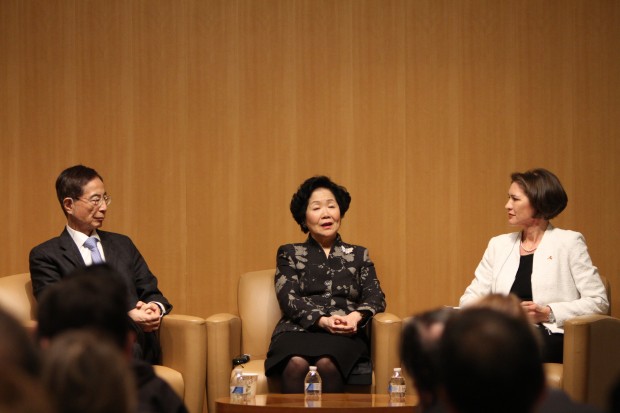
Former founding Chairman of the Democratic Party of Hong Kong, Martin Lee, and former Chief Executive of Hong Kong, Anson Lee, participate in a panel at the National Endowment for Democracy on April 2, 2014
With Hong Kong’s march toward universal suffrage in 2017 in serious doubt, the Hong Kong media, for decades a bastion of dynamic independent journalism, is struggling under crippling economic pressure from Beijing.
The Basic Law of Hong Kong, co-signed by the governments of the United Kingdom and the Peoples’ Republic of China (PRC) prior to the city’s 1997 handover, stipulates that for at least 50 years “Hong Kong residents shall have freedom of speech, of the press and of publication.” At the time of the handover, there were fears that Hong Kong’s reputation as an epicenter for criticism of PRC policies would make the media a target of a Beijing-led crack down.
No such intervention took place, but as Sarah Cook notes in her 2013 CIMA report The Long Shadow of Chinese Censorship, “a gradual transformation occurred in the media ecology in Hong Kong throughout the 1990s and early 2000s. The result was a rise in self-censorship on topics deemed sensitive by Beijing and a collective shift in media coverage towards less critical discourse.”
Today the media is facing an increasingly difficult business environment shaped by China’s influential economy and the regime’s sensitivity over its public image. During a visit to Washington last week, former Chief Secretary of Hong Kong, Anson Chan, and founding Chairman of the Democratic Party of Hong Kong, Martin Lee, explained that the Chinese government uses its economic power to pressure local, and even international businesses, to withdraw advertisements from outlets deemed unfavorable to Beijing. According to Chan, businesses and media owners that capitulate to Chinese pressure are too short-sighted and must consider the long-term implications of their decisions. “Rolling over” to Chinese pressure now “will only make it harder to resist pressure in the future.”
Don Podesta, Manager and Editor at CIMA, suggests that by “selling yourself to the devil, you undermine your credibility” with consumers in the long run and that could also have serious financial consequences.
According to Lee, only one daily newspaper, the Apple Daily, still operates with a truly independent voice. Though it and its parent company, Next Media, have suffered heavy financial losses from advertising pull-outs orchestrated by Beijing, the company’s deep pockets allows it to withstand the onslaught.
Unfortunately, in today’s Hong Kong there are few pockets as deep as Next Media’s, making the sustainability of independent media outlets susceptible to pressure on the business environment. If Hong Kong’s historically dynamic media is to play its rightful role in the city’s march toward democracy, media outlets must find ways to act boldly and innovatively in the face of overwhelming economic pressure from China.

Comments (0)